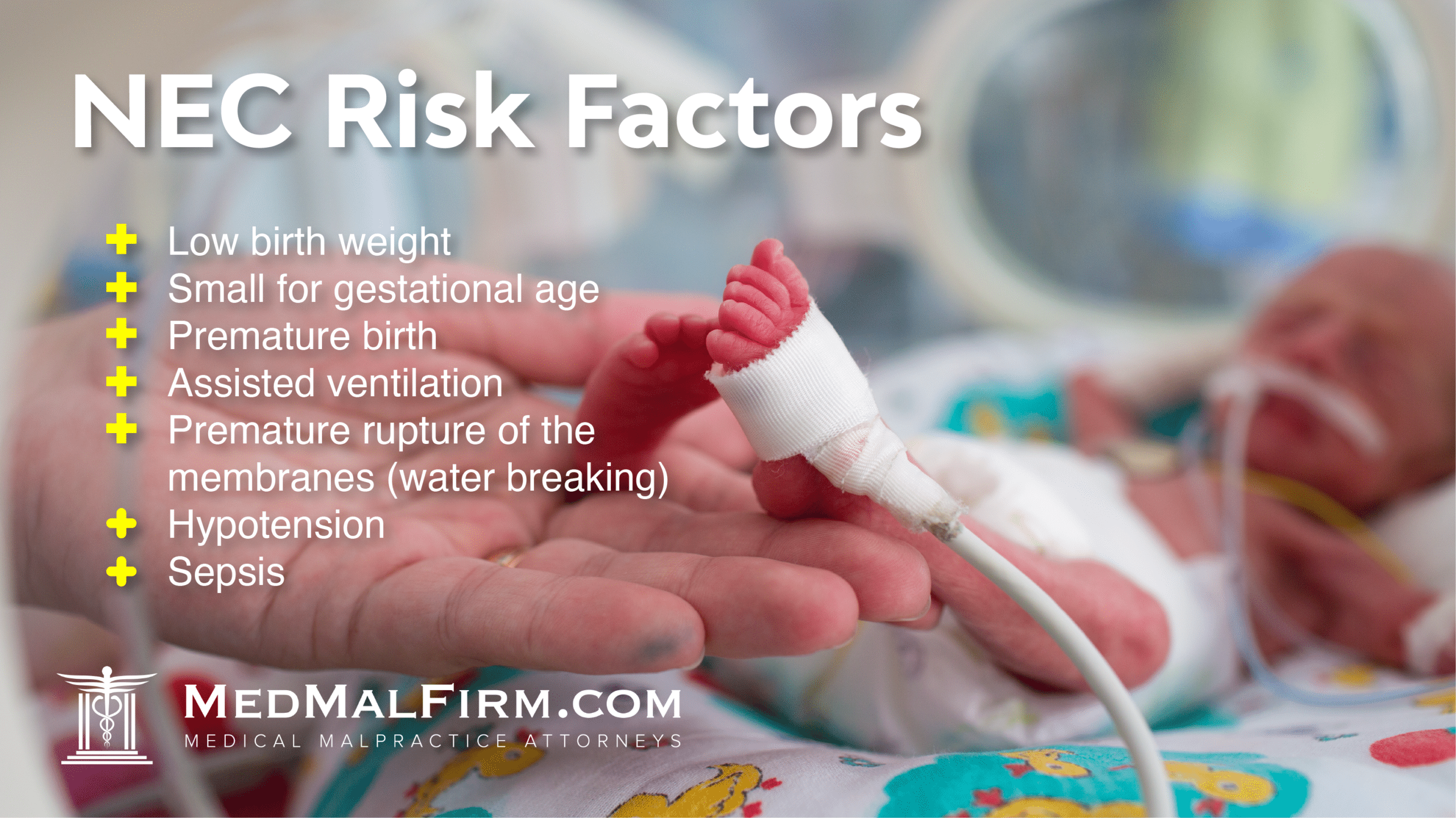
NEC Risk Factors
One of the most important parts of preventing diseases is understanding what causes them, and what risk factors make patients vulnerable. In the case of necrotizing enterocolitis, or NEC, identifying NEC risk factors is one…
One of the most important parts of preventing diseases is understanding what causes them, and what risk factors make patients vulnerable. In the case of necrotizing enterocolitis, or NEC, identifying NEC risk factors is one of the best ways to reduce instances of the disease and protect vulnerable newborns.
NEC Background
NEC is the most common intestinal disease affecting premature newborns. It generally occurs while the newborn is still in the hospital or neonatal intensive care unit (NICU). NEC develops when tissue in the intestines becomes inflamed, injured or infected. As a result, tissue can begin to degrade or die.
An infant with NEC is at risk for complications including:
- Bowel Perforation: A bowel perforation is dangerous because the intestines no longer hold bodily waste. Instead, it is released into the abdominal cavity and bloodstream.
- Sepsis: An infection can lead to sepsis if the infant is unable to fight it off, or if the infant’s body has an overwhelming response to the infection. Neonatal sepsis can develop in the first days of life, or within the first few weeks or months. In cases of NEC, it generally develops within the first few weeks.
- Death: Sadly, around 50% of infants with NEC do not survive. Premature and low birth weight newborns are incredibly vulnerable to diseases like NEC. Their immune systems often are not capable of fighting off the disease.
Infants with NEC may also have other complications that relate more to their overall health, rather than their NEC diagnosis. For example, if the infant was deprived of oxygen during birth, he or she may also have brain damage, and may have organ dysfunctions due to restricted oxygen to those areas.
NEC Risk Factors

Unfortunately, there have only been a handful of prognostic studies completed related to NEC. There is much more research on the causes of NEC than the risk factors. From what we do know, studies show that NEC risk factors include:
- Low birth weight
- Small for gestational age
- Low gestational age (prematurity)
- Assisted ventilation
- Premature rupture of the membranes (water breaking)
- Hypotension
- Sepsis
Premature birth appears to be the most significant risk factor. Research shows that 5-10% of premature infants develop NEC. Rates are much lower in full-term infants. Experts believe that premature infants are so vulnerable to NEC because of intestinal immaturity and an immature immune system.
Preventing NEC
Understanding NEC risk factors is the best way to work toward preventing the disease. While there is no way to prevent every instance of premature birth or other complications, experts and researchers do believe that there is one key to preventing NEC, or reducing the rate of occurrence, at the very least.
Experts and research agree that the best way to prevent NEC is to ensure that premature newborns are fed an exclusively human milk-based diet. Experts believe that prioritizing human milk will reduce NEC rates in hospitals because human milk (breast milk) contains important protections that premature newborns need.
Human milk contains immunoglobulins and lactoferrin, which promote intestinal adaptation and maturation. They also protect the infant from infective diseases and inflammatory disorders. Research shows that infants fed an exclusive human milk diet have a decreased risk of NEC.
Cow’s milk-based formulas, on the other hand, do not contain these ingredients. Instead, their primary ingredient is bovine protein, which immature digestive systems cannot adequately process. As a result, proteins and bacteria can build up in the infant’s intestines causing inflammation, infection and NEC.
Information for Parents
Unfortunately, parents are often not informed about the risks of using cow’s milk-based formulas, even in NICUs. Formula manufacturers do not include warnings about NEC or guidelines for how to prevent it when using formula products. Healthcare providers also are often unaware of the risk, or may consider formula to be the best option given the child’s health.
That’s why at MedMalFirm.com, we are trying to help inform parents, caregivers and healthcare providers about NEC risk factors, including cow’s milk-based formulas. We want to help parents, in particular, have as much information as possible so that they can make the best decisions possible for their child.
If you have questions about NEC, give us a call at 877-887-4850. You can also learn more by completing our NEC contact form. There is no cost or obligation to learn more.
Sources:
